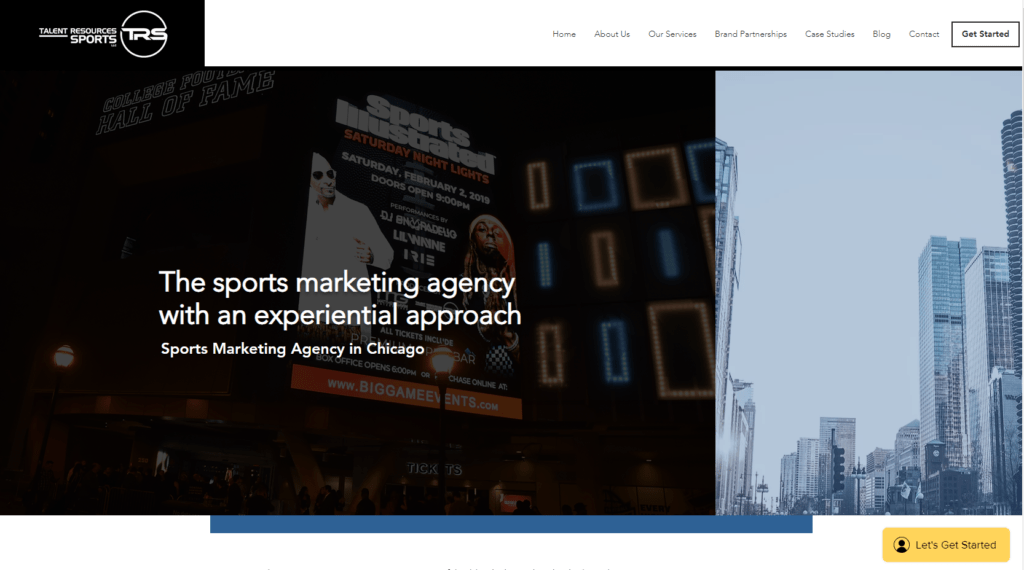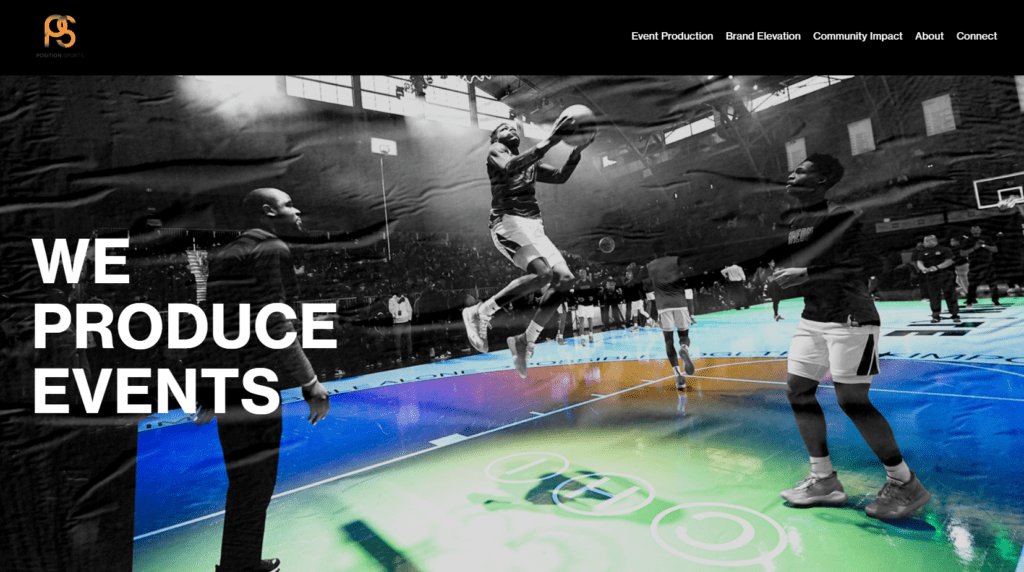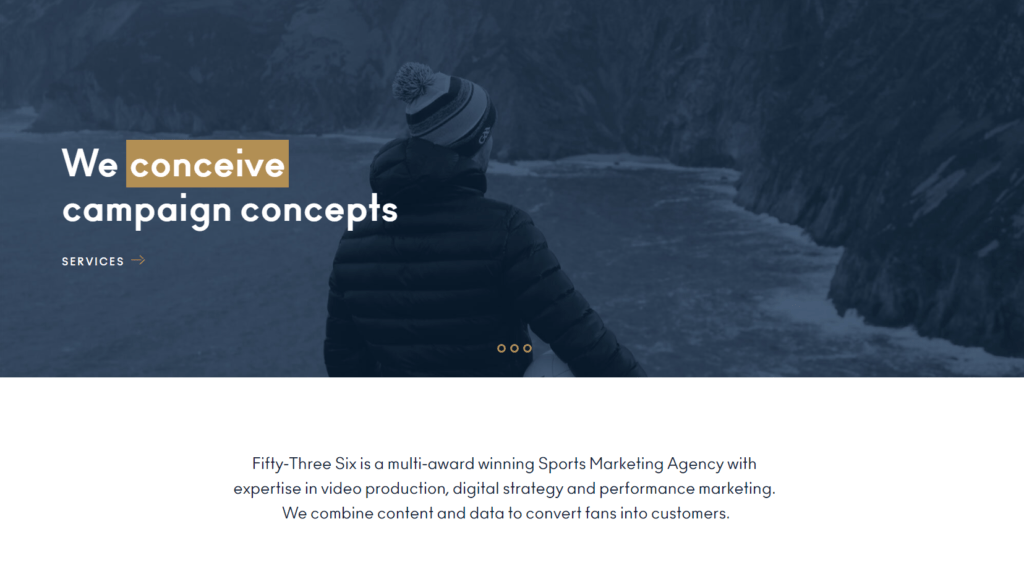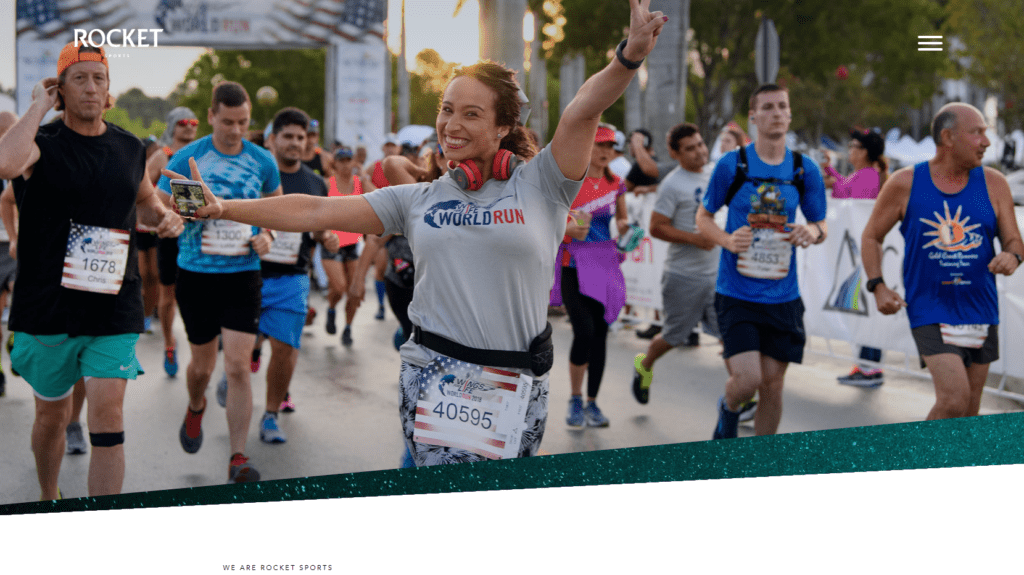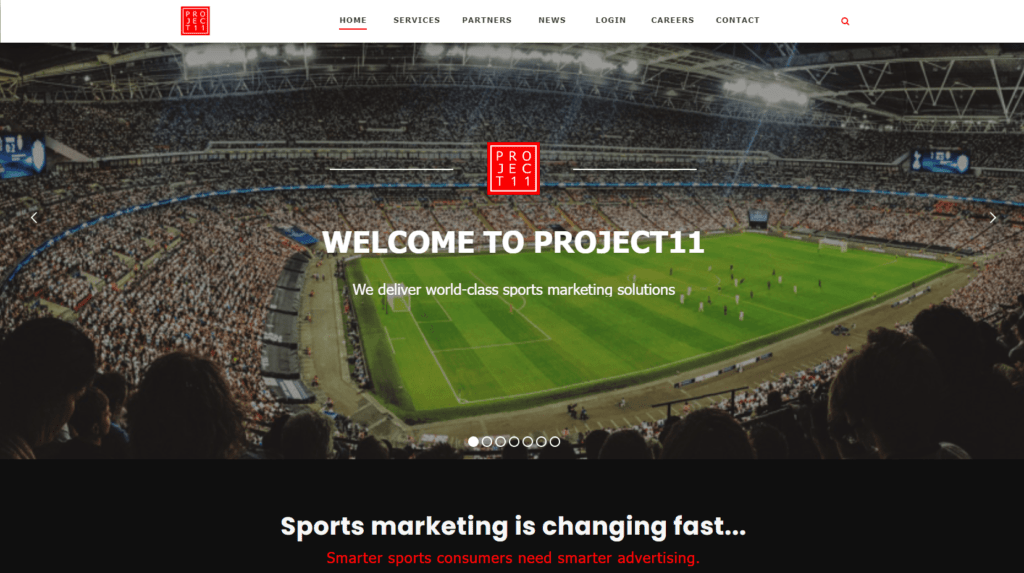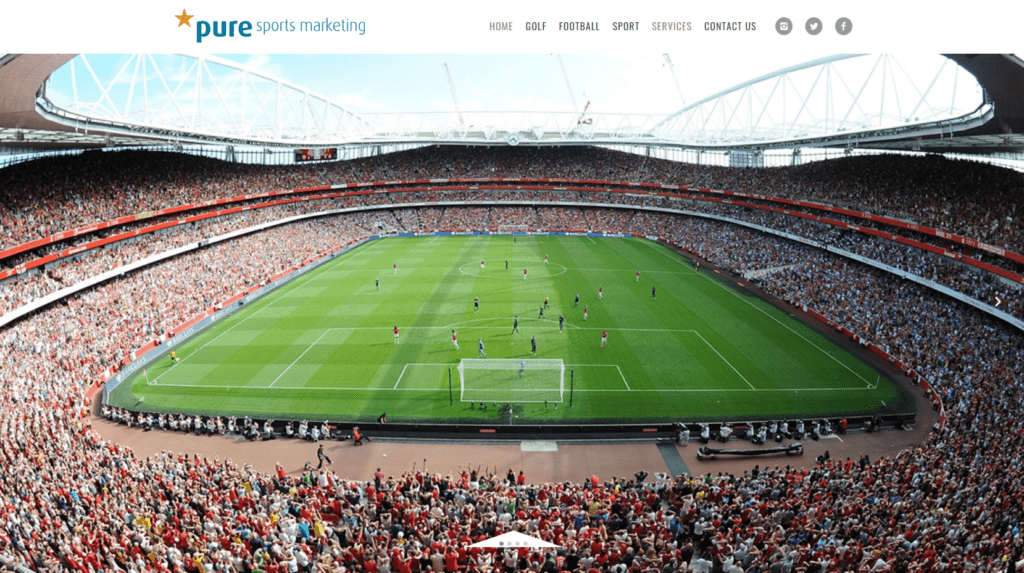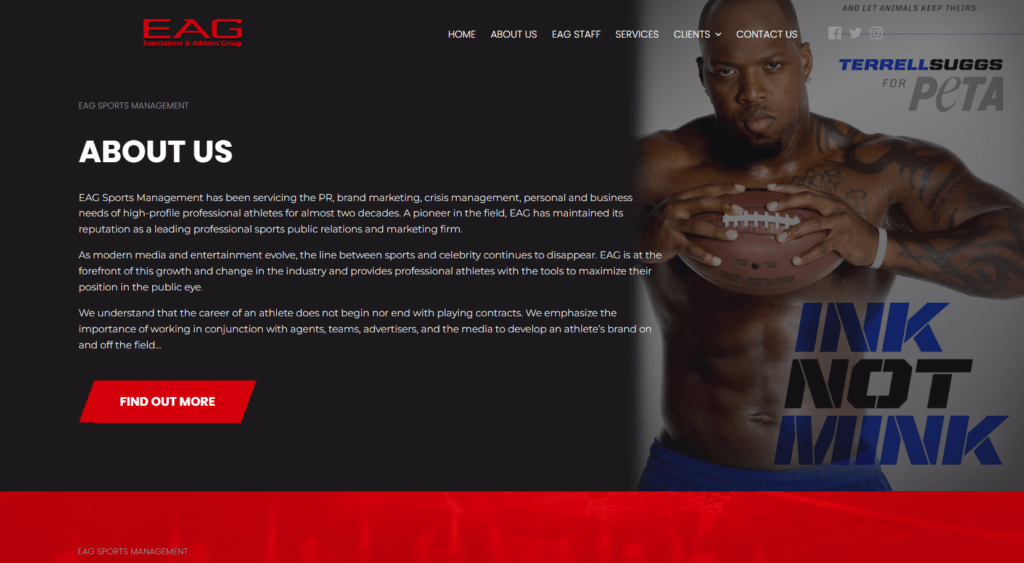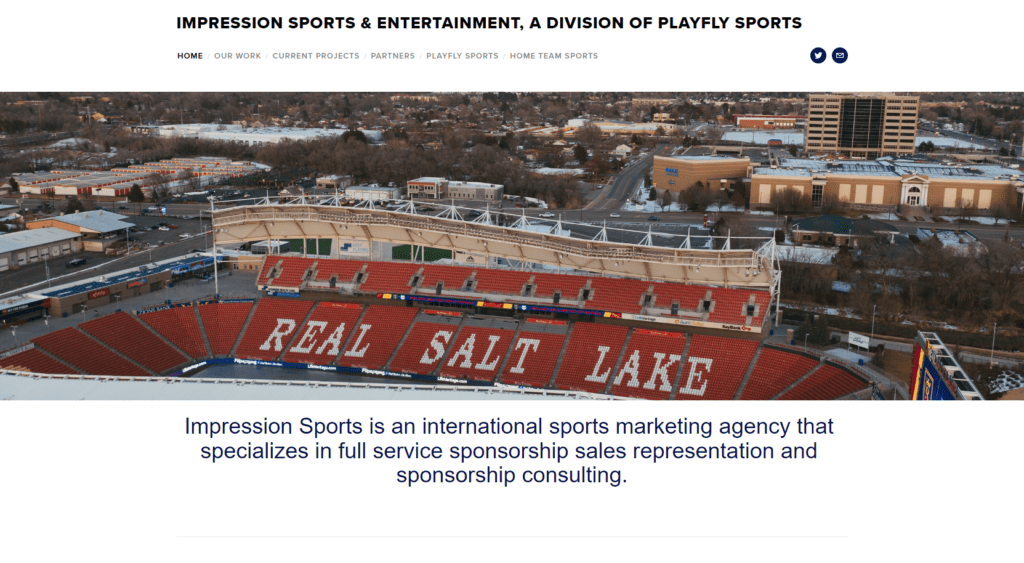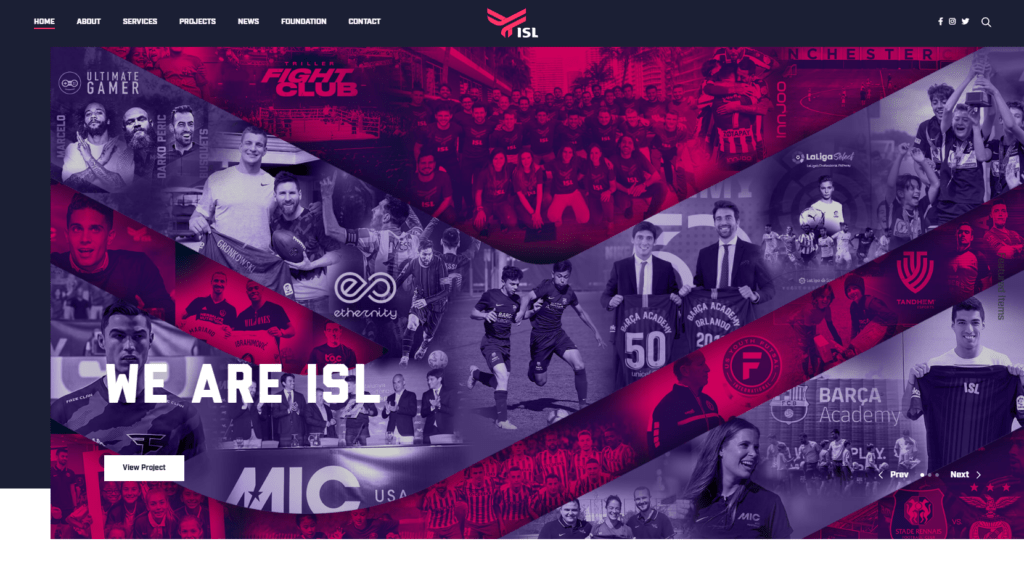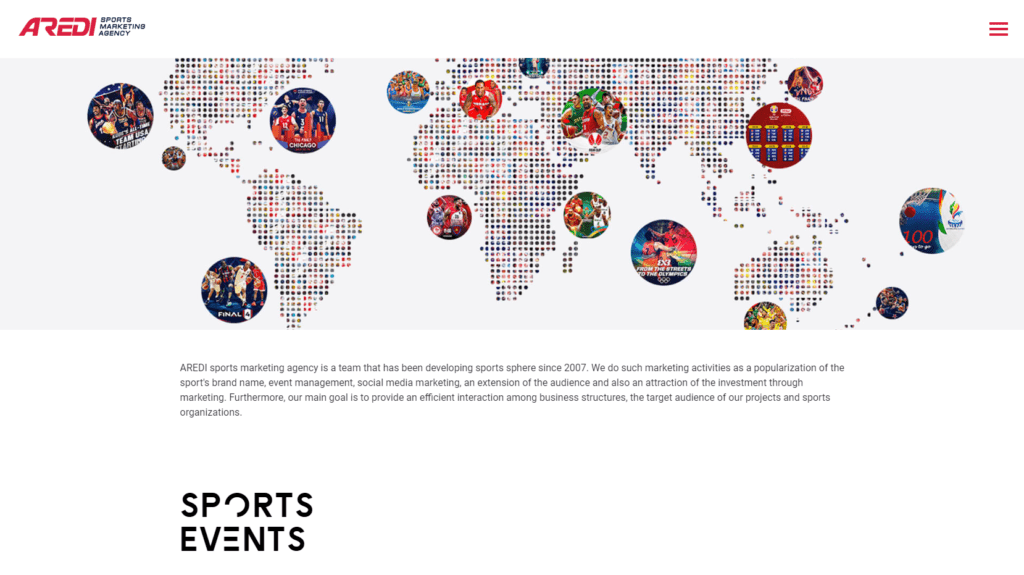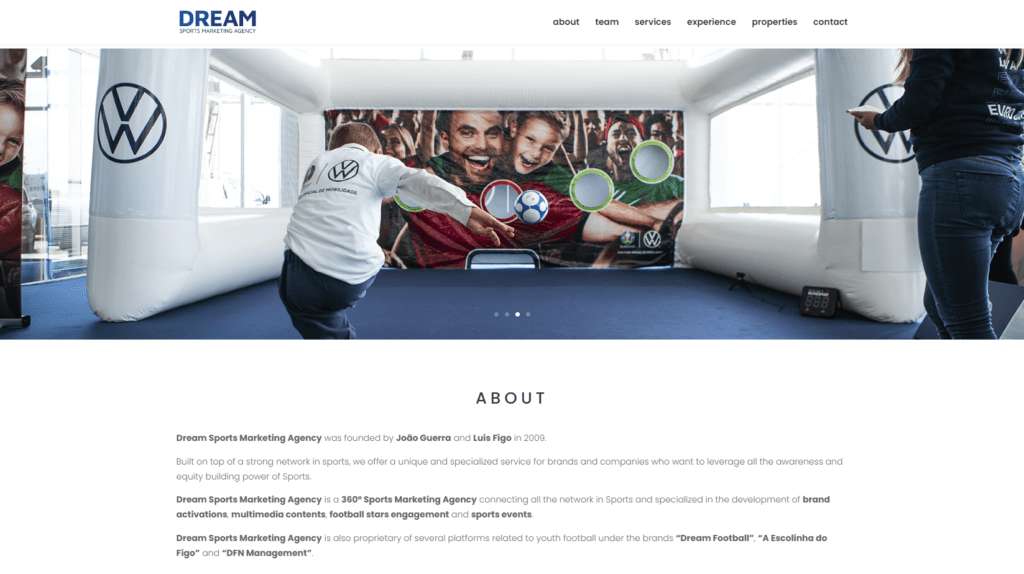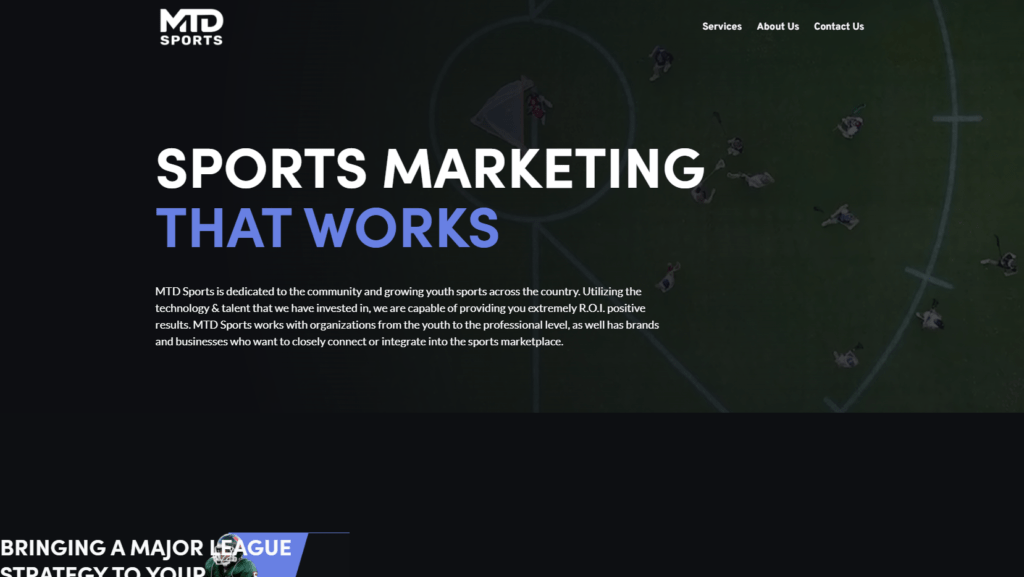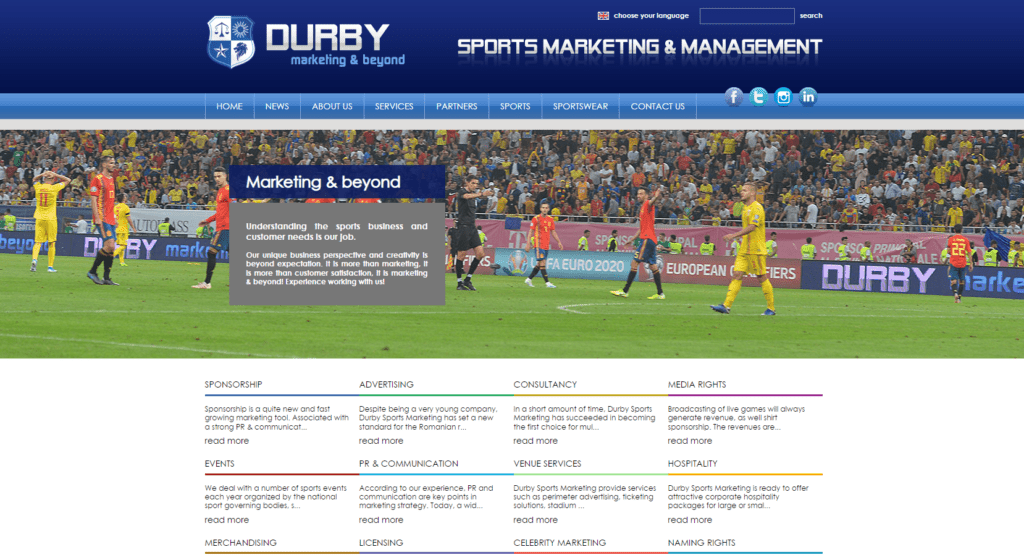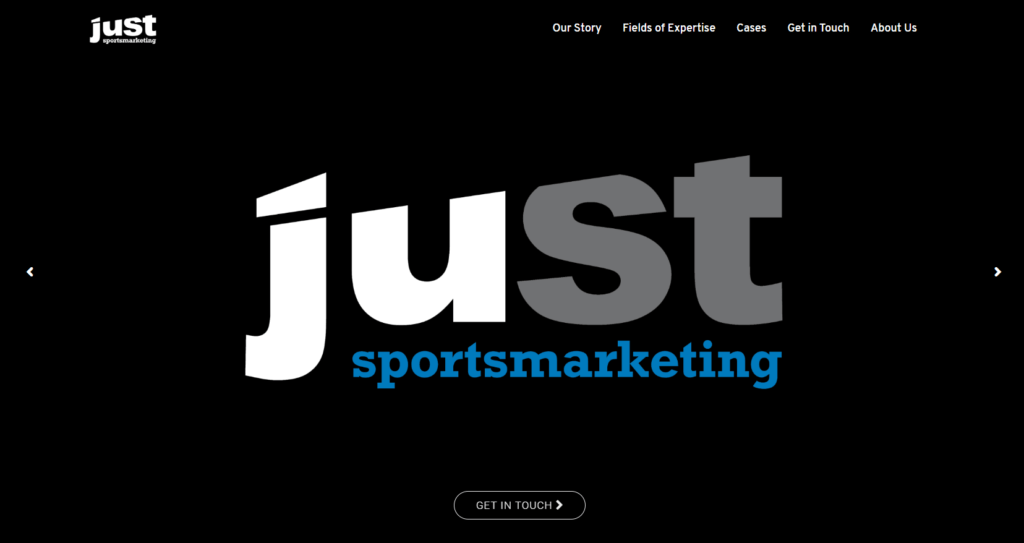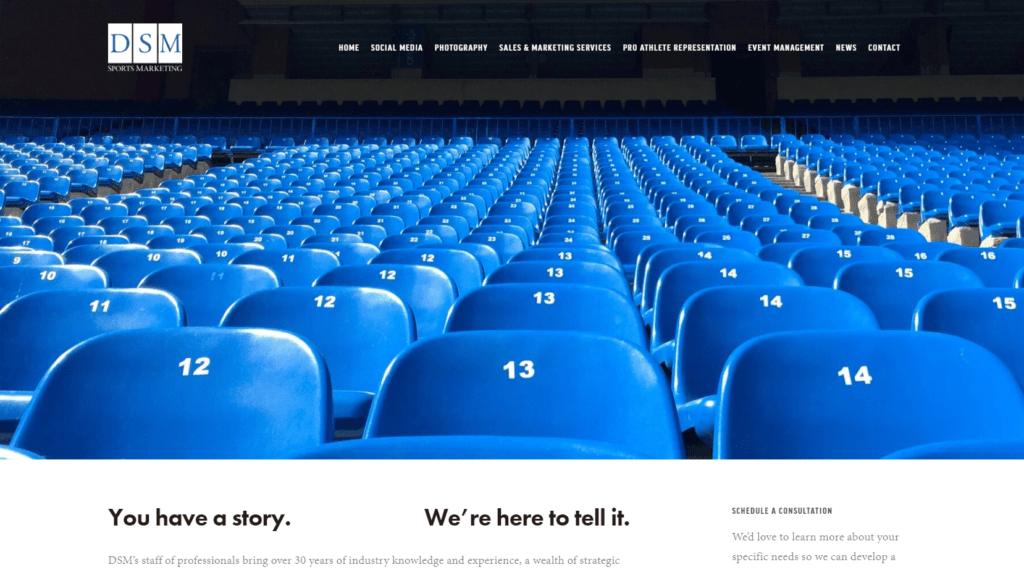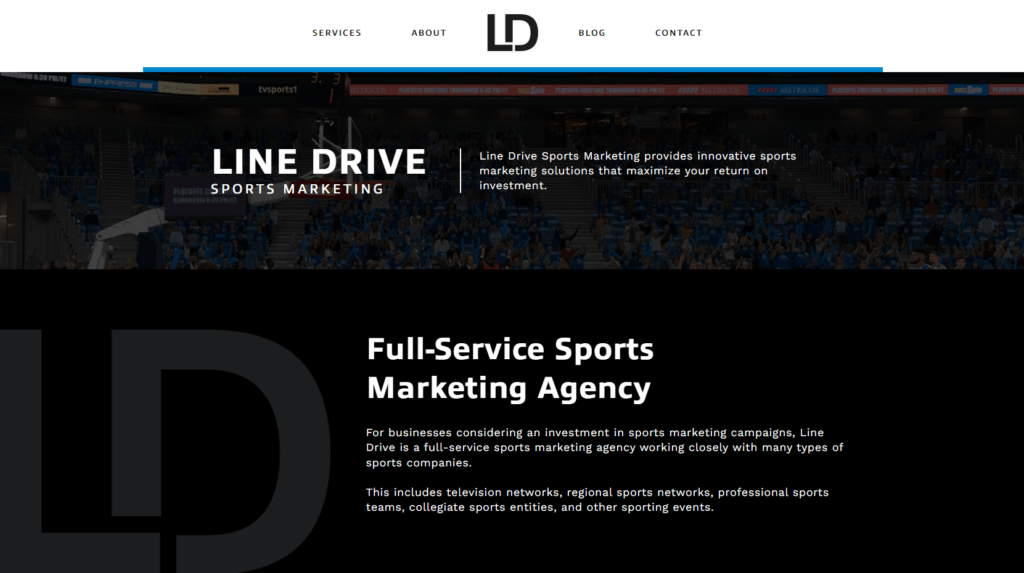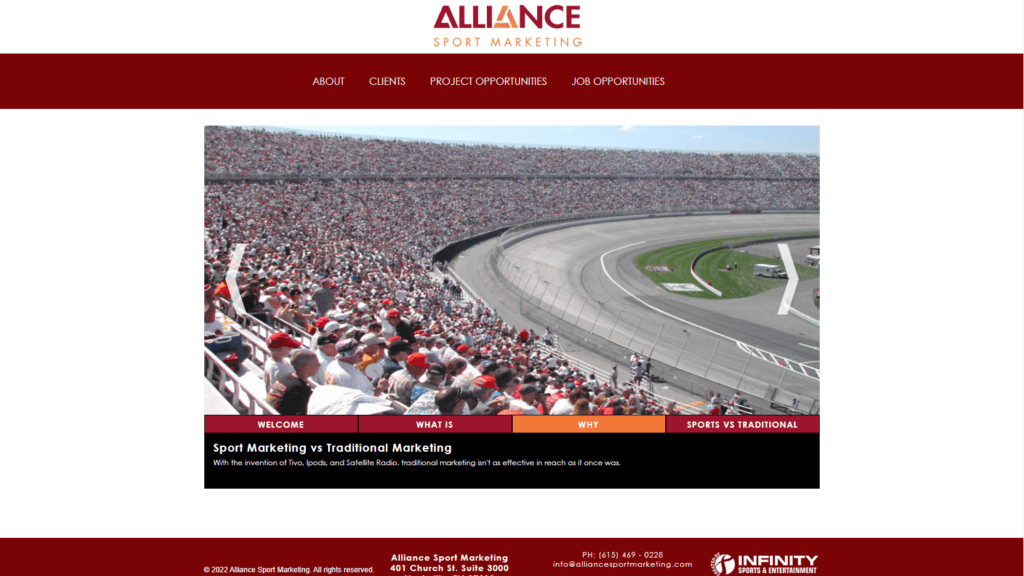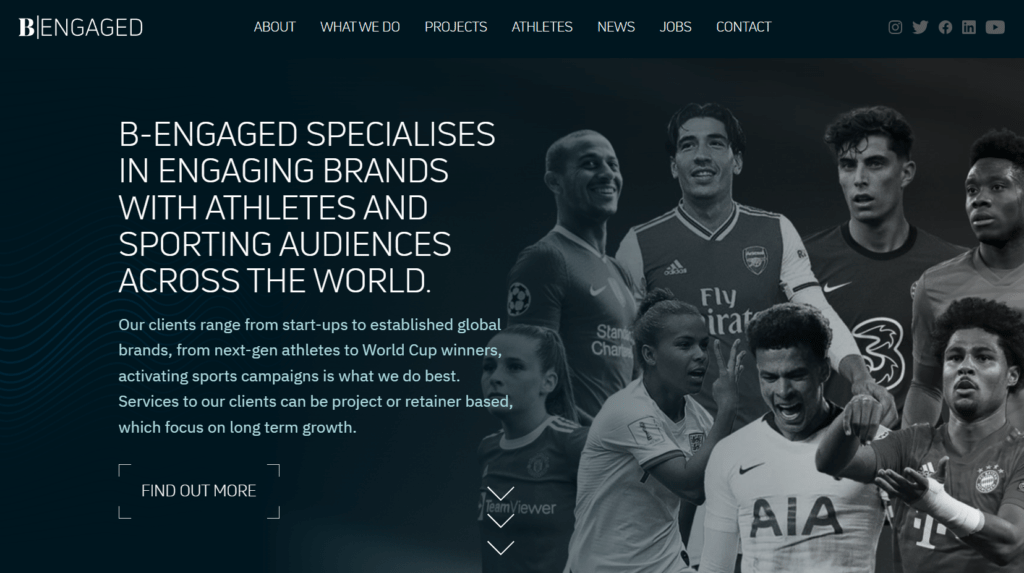
13 Jul BEST SPORTS MARKETING AGENCIES IN 2024
A sports marketing agency is a company that specializes in the promotion and marketing of sports events and products. Sport marketing agencies work with clients to create advertising and promotional campaigns that generate interest and excitement for their products or events. The best sports marketing agencies deeply understand the sports industry and can utilize their knowledge to create effective campaigns that resonate with fans and consumers.
Sport marketing agencies typically offer various services, including event management, media relations, sponsorship sales, and product placement.
As there are so many sports marketing agencies out there, here at Amra & Elma, we have put up a list of the top sports marketing agencies for 2024 that can assist businesses in increasing their media presence, focusing on the right audience, and maximizing their return on investment. Our list contains their services, clients, partners, noteworthy accomplishments, top media mentions, and pricing.
Below is the curated list of top sports marketing agencies in 2024:
what is a sports marketing agency?
A sports marketing agency is a specialized firm that provides marketing services tailored specifically to clients within the sports industry. These agencies focus on promoting sports-related products, events, teams, athletes, leagues, and organizations through various marketing channels and strategies.
Services offered by sports marketing agencies may include:
1. Brand Strategy and Positioning: Developing and refining brand identity, messaging, and positioning strategies for sports brands, teams, and organizations to differentiate them in the marketplace and resonate with target audiences.
2. Sponsorship Activation: Identifying, negotiating, and activating sponsorship opportunities for brands to align with sports properties, events, teams, athletes, and leagues. This may include leveraging brand exposure through signage, endorsements, product placements, and experiential activations.
3. Athlete Endorsements and Partnerships: Securing endorsement deals and partnerships with athletes to leverage their influence, credibility, and star power in marketing campaigns and promotions. This may involve selecting suitable athletes, negotiating contracts, and managing relationships between brands and athletes.
4. Event Marketing and Management: Planning, promoting, and executing sports events, tournaments, championships, and exhibitions to attract attendees, generate excitement, and increase ticket sales and viewership. This may include venue selection, logistics coordination, marketing campaigns, and fan engagement activities.
5. Digital Marketing: Implementing digital marketing strategies such as social media marketing, content marketing, email marketing, and influencer partnerships to reach sports fans, engage audiences, and drive online traffic and conversions.
6. Fan Engagement and Community Building: Creating fan engagement initiatives, loyalty programs, and interactive experiences to foster deeper connections between sports brands, teams, and fans. This may involve developing fan clubs, organizing meet-and-greets, and facilitating fan interactions with athletes and teams.
7. Merchandising and Licensing: Developing and managing merchandising and licensing programs for sports brands and organizations to monetize their intellectual property rights. This may include designing and selling branded apparel, accessories, and merchandise to fans and consumers.
8. Public Relations and Media Relations: Managing media relations, press releases, and publicity efforts to generate positive media coverage, increase brand exposure, and enhance brand reputation within the sports industry. This may involve securing interviews, features, and editorial placements in sports media outlets and publications.
9. Market Research and Consumer Insights: Conducting market research, trend analysis, and consumer surveys to identify market opportunities, understand fan preferences, and inform marketing strategies and product development.
10. Analytics and Performance Tracking: Utilizing data analytics tools to track key performance indicators (KPIs), measure the effectiveness of marketing campaigns, and optimize strategies for better results. This may involve analyzing fan engagement metrics, ticket sales data, social media analytics, and website traffic.
Sports marketing agencies leverage their expertise in marketing, branding, and sports to help clients within the sports industry achieve their marketing objectives, increase brand visibility, engage fans, and drive revenue. They work closely with sports brands, teams, leagues, sponsors, and other stakeholders to develop and implement customized marketing strategies that align with their brand identity, target audience, and business goals.
how does a sports marketing agency differ from general agencies?
A sports marketing agency differs from a general marketing agency in several key ways:
1. Industry Focus:
– Sports Marketing Agency: Specializes exclusively in providing marketing services tailored to clients within the sports industry, including sports brands, teams, athletes, leagues, events, and organizations. They have in-depth knowledge of the sports landscape, including fan behavior, industry trends, and the unique dynamics of sports marketing.-
– General Marketing Agency: Offers marketing services across various industries, serving clients from diverse sectors such as technology, healthcare, finance, consumer goods, and more. While they may provide marketing support to sports-related clients, their expertise may not be as specialized in the nuances of sports marketing.
2. Target Audience Understanding:
– Sports Marketing Agency: Understands the specific characteristics, behaviors, and preferences of sports fans and enthusiasts. They tailor marketing strategies to resonate with sports-oriented audiences and leverage the emotional connection that fans have with sports brands, teams, and athletes.
– General Marketing Agency: Develops marketing campaigns that cater to broader audience segments, with less specialization in understanding the specific interests and motivations of sports fans.
3. Brand Association and Sponsorship:
– Sports Marketing Agency: Often works closely with sports brands, teams, leagues, and sponsors to create marketing campaigns that leverage brand association with sports properties. They may specialize in activating sponsorship deals, integrating brand messaging into sports events, and maximizing the impact of brand partnerships within the sports industry.
– General Marketing Agency: May not have the same level of expertise or focus on leveraging brand association with sports properties. While they may work with sponsors across various industries, their approach to sports sponsorship activation may not be as specialized.
4. Sports Industry Relationships:
– Sports Marketing Agency: Often has established relationships and networks within the sports industry, including connections with sports brands, teams, leagues, athletes, sponsors, broadcasters, and sports media outlets. These relationships enable them to access industry insights, collaborations, and opportunities tailored to sports-related clients.
– General Marketing Agency: May not have the same level of industry connections within the sports sector, potentially limiting their ability to leverage specialized resources and partnerships specific to sports brands and properties.
5. Trend Awareness and Industry Insights:
– Sports Marketing Agency: Stays abreast of the latest trends, developments, and events within the sports industry, allowing them to adapt marketing strategies and campaigns to align with current sports trends and fan interests.
– General Marketing Agency: May not have the same level of expertise or focus on staying updated with sports-specific trends and insights, potentially resulting in less targeted or relevant marketing efforts for sports-related clients.
Overall, while both sports marketing agencies and general marketing agencies offer marketing services, sports marketing agencies differentiate themselves through their industry specialization, deep understanding of sports audiences, focus on brand association with sports properties, industry relationships, and expertise in navigating the unique dynamics of the sports industry.
ABOUT
Amra & Elma is a leading sports marketing agency specializing in a wide range of results-oriented marketing services, including media buying, SEO, influencer marketing, branding, PR, and marketing services, including media buying, SEO, influencer marketing, and branding, PR, and much more. Our agency was formed by two popular social media influencers who were titled by Nasdaq as “top marketers” and recognized by Yahoo News for building a “Digital Empire.”
Our work has been highlighted in numerous media outlets, including Bloomberg, USA Today, Time, Wired, Huff Post, and more. We were designated the “Top Digital Agency” by the Financial Times and the “Epicenter of Influence” by Forbes. Our clients include top sports brands and Fortune 500 companies, like Puma, Alo, TechnoGym, Orgain, and more.
Our team of advertising, branding, and event specialists, creative content developers, and marketing strategists work closely with sports brands to help them gain a competitive edge in the sports market, enhance their ROI, and build trust with their target audience. We have a 1M+ sports, health, wellness, and fitness influencers database and have executed over 580 influencer marketing campaigns for international brands. We rank for over 18.000 targeted keywords on Google, resulting in over 2.3 million organic impressions, and we specialize in brand growth.
SPECIALIZES IN
- Media buying
- Influencer marketing
- Social media management
- PR
- Content production
- SEO
- Branding
- Digital strategy
CLIENTS
- Johnson & Johnson
- Netflix
- Uber
- HTC
- Nestle
- Bvlgari
- Net-a-porter
MEDIA MENTIONS
PRICING
Price available upon request.
ABOUT
Top Influencer Marketing Agency is one of leading sports marketing agencies specializing in sponsored influencer posts, events, gifting, trips, and content production. They focus on connecting leading brands with their niche audiences via nano, micro, and macro influencers on social media. They also specialize in growing social media accounts and increasing both organic account visibility, following, and engagement. They work with influencers to create exceptional content for brands to be used on social media and the website, increase organic website traffic, and boost e-commerce conversions. They have worked with numerous small to mid-sized companies, including Clove & Hallow, Closet 52, North Country, Utilitarian, and more. Their team of marketing rockstars continues to set new records for brand growth and exceeds ROI expectations.
SPECIALIZES IN
- Media buying
- Influencer sponsored posts
- Influencer gifting
- Social media follower growth
- Social media engagement growth
- Influencer content production (videos and photos of influencers featuring the product)
- Events
- Influencer trips
- Content production
- PR
CLIENTS
- Johnson & Johnson
- Netflix
- Uber
- HTC
- Nestle
- Bvlgari
- Net-a-porter
MEDIA MENTIONS
Forbes, Nasdaq, Bloomberg, WSJ, Time Magazine, Business Insider, Financial Times, Marie Claire, InStyle, Huff Post, Entrepreneur.
PRICING
Price available upon request.
ABOUT
Talent Resources Sports specializes in connecting sports persons with your brand as a sports marketing agency. Their collaborations have spelled success for many organizations and brought recognition, awareness, and business growth. All of their clients have benefitted irrespective of size, industry, and budget. Their experiential approach is what sets them apart from other sports marketing agencies. By immersing yourself in the experience, they can create long-lasting relationships between sports fans and your brand. Talent Resources Sports is the perfect partner if you’re looking to take your sports marketing to the next level.
SPECIALIZES IN
- Events
- Athlete Appearances
- Social Media Endorsements
- Advertising
- Branding & Identity Design
- Copywriting
- Digital Marketing
- Marketing Strategy
- Media Planning & Buying
- Public Relations
- Responsive Web Design
- Search Engine Optimization
- Social Media Strategy
- Video & Animation
- Visual Design
- Web Development
CLIENTS
- amazon
- KIA
- Wendy’s
- TRACFONE
- Sabra
- Rolling Stone
- Red Bull
- Ralph Lauren
- POINTSbet
- PopChips
- Playboy
- MAXIM
- blu
- Dewar’s
MEDIA MENTIONS
Media mentions are not available right now.
PRICING
- Minimum project size $10,000+
- Average hourly rate $150 – $199 / hr.
ABOUT
Position Sports is one of the sports marketing agencies in the nation that focuses on corporate branding, media relations, marketing, consulting, and event operations. It is based in Phoenix, Arizona, where it provides athletes and corporate clients with an expanded strategic direction needed to succeed in sports marketing. Athletes who use Position Sports have the advantage of utilizing the company’s public relations and marketing expertise and its ties to potential endorsers. In addition, Position Sports produces events for its athlete clients, such as summer basketball camps, community outreach events, and golf tournaments. This allows athletes to focus on their sports while still receiving the benefits of expert sports marketing. As a result, Position Sports can provide a unique and valuable service to its clients.
SPECIALIZES IN
- Event Production
- Brand Elevation
- Community Impact
- Advertising
- Architectural Design
- Branding
- Content Marketing
- E-commerce Development
- Email Marketing
- Graphic Design
- Social Media Marketing
- Web Design
- Web Development
CLIENTS
- NIKE
- Jordan Brand
- MLB
- T-Mobile
- Clorox the Basketball Hall of Fame
- Burger King
- USA Basketball
- Powerade
- Gatorade
- McDonald’s
- 2K Sports
- Boost Mobile
- Foot Locker
- Upper Deck
- Coca-Cola.
MEDIA MENTIONS
Not available.
PRICING
- Minimum project size: $10,000+
- Average hourly rate $150 – $299 / hr.
ABOUT
Sports sponsorship is a powerful marketing tool that has the potential to reach a broad audience and create lasting brand recognition. However, crafting an effective sports sponsorship strategy requires careful planning and execution. That’s where Allied Sports comes in. As a full-service sports marketing agency, they have the experience and expertise to help their clients maximize the impact of their sponsorship investment. From identifying suitable properties and negotiating favorable terms to developing creative activation campaigns, they will work tirelessly to help their clients achieve their objectives. Whether their goal is to build brand awareness, drive sales, or create other forms of value, Allied Sports is committed to helping them succeed.
SPECIALIZES IN
- Insights
- Research
- Partnership
- Commercials
- Analytics
- Advertising
- Digital Strategy
- Marketing Strategy
- Media Planning & Buying
- Public Relations
CLIENTS
- CISCO
- DC United
- Deloitte
- Disney
- Florida Panthers
- NFLPA
- Hall of Fame Village
- NWSL
- Prime Video
- Quakes FC
- Quest Diagnostics
- XDC Network
MEDIA MENTIONS
Not available.
PRICING
- Minimum project size $15,000+
- Average hourly rate $150 – $199 / hr.
ABOUT
Fifty-Three Six is a sports marketing agency that allows sports organizations and businesses to use video to convert fans into customers. The company was founded in 2013 by Sam Jones and Harry Davies-Carr, to change the sports marketing landscape. Fifty-Three Six has worked with some of the biggest names in the sports industry, including Nike, Adidas, and the International Olympic Committee. The company has also produced award-winning campaigns for Virgin Media and BMW brands. In 2018, Fifty-Three Six was named Sports Agency of the Year at the Advertising Standards Authority Awards. The company is headquartered in London, with offices in New York and Los Angeles.
SPECIALIZES IN
- Video Production
- Corporate Marketing
- Performance Marketing
- Digital Strategy
- Strategic positioning
- Copywriting
- Web Design and SEO
- Digital Marketing
- Lead Generation
- Creative Idea Generation
CLIENTS
- Virgin Media
- Nike
- Adidas
- International Olympic Committee
- IRFU
- bet365
- Allianz
- Racing TV
- MACE
- Munster Rugby
- HORIZON
- LIDL
- GymCoffee
- StarSixes
- Pitch International
- SPAR
- Kinetica
- joymo
- playerdata
MEDIA MENTIONS
Not available.
PRICING
- Minimum project size: $25,000+
- Average hourly rate $150 – $299 / hr
ABOUT
Established in 2004 by Sir Elton John, Rocket Sports is a sports marketing agency specializing in athlete management, brand partnerships, and creative content campaigns. The company has worked with some of the biggest names in sports and entertainment, including LeBron James, Serena Williams, and Jay-Z. Rocket Sports is considered a pioneer in the sports marketing industry, and its innovative marketing approach has helped them achieve great success. In recent years, the company has expanded its operations to include a digital media team that creates original content for its clients. The team’s work has been featured in major publications such as Forbes and The New York Times. Thanks to their cutting-edge work, Rocket Sports has become one of the world’s most respected sports marketing agencies.
SPECIALIZES IN
- Sports Advertising
- Event Management
- Tournament Organization
- Pay Per Click Advertising
- Social Media Marketing
- Public Relations
- Search Engine Optimization
- Web Design
- Web Development
- Conversion Optimization
CLIENTS
- HSBC
- Tag Heuer
- Bar Clif
- Dreams
- adidas
- DHL
- Continental
- Investec
- Red Bull
- Peloton
- Toyota
- Muller
- Zwift
- Pact Coffee
- Purple Bricks
- GymShark
- fi’zi:k
MEDIA MENTIONS
- Media mentions are currently not available.
PRICING
- Minimum project size $15,000+
- Average Hourly Rate $150 – $299 / hr
ABOUT
Project11 is a sports marketing agency that delivers innovative perimeter LED advertising and exciting sponsorship and partner opportunities. They represent a wide range of sports, including Snooker, Boxing, and Darts. Project11 sells directly to clients and produces the creatives themselves. This allows them to offer more personalized service and create bespoke campaigns that deliver results. Their in-house team of experienced professionals is passionate about sports and understands the unique selling points of each one. This knowledge allows them to create campaigns that resonate with fans and deliver tangible results for their clients. If you’re looking for a sports marketing agency to help you achieve your objectives, then Project11 should be at the top of your list.
SPECIALIZES IN
- EPL Perimeter Advertising
- Tennis Opportunities
- Strategic Partnerships
- Esports & Gaming
- Sponsorships
- Content Marketing
- Social Media Marketing
- Branding
- Public Relations
- Marketing Strategy
CLIENTS
- Hainan Airlines
- GSK
- Chevron
- BMW
- AirFrance
- Zurich
- betsson group
- Unicef
- World Snooker
- Total
- P&G
- Philips
- SKS365
- ATP World Tour
- Matchroom Boxing
MEDIA MENTIONS
Media mentions are not available right now.
PRICING
- Minimum project size $10,000+
- Average hourly rate $150 – $299 / hr
ABOUT
Pure Sports Marketing is an award-winning sports marketing agency specializing in marketing, PR, and communications within the sports industry. With a track record of delivering meaningful marketing campaigns, they have the experience and expertise to help promote and manage sports brands, people, and products. As a full-service sports marketing company, they offer a comprehensive suite of services that can be tailored to meet the unique needs of their clients. Whether you’re looking to launch a new sports product or build awareness for an existing brand, Pure Sports Marketing has the knowledge and resources to help you achieve your objectives. Contact Pure Sports Marketing today to learn more about what they can do for you.
SPECIALIZES IN
- Branding & Design
- Marketing Strategy & Research
- Social Media Marketing
- Video & TV Production
- Website Development
- SEO & Paid Search
- Media Planning & Buying
- Public Relations
- Direct Mail & Email Marketing
- Analytics
- Content Creation
CLIENTS
- EVNROLL Partners
- Premier Licensing
- Mizuno
- Originals
- MATT FRYER
- PPG
- Kedleston Park Golf Club
- Fujikura
MEDIA MENTIONS
Not available.
PRICING
- Minimum project size $10,000+
- Average hourly rate $100 – $299 / hr.
ABOUT
EAG Sports Management has been servicing high-profile professional athletes’ PR, brand marketing, crisis management, and personal and business needs for almost two decades. A pioneer in the field, EAG has maintained its reputation as a leading sports public relations and marketing firm.
As modern media and entertainment evolve, the line between sports and celebrities continues to disappear. EAG is at the forefront of this growth and change in the industry and provides professional athletes with the tools to maximize their position in the public eye. The agency also keeps up with the latest trends in sports marketing and uses cutting-edge approaches to help its clients stay ahead of the competition.
Whether negotiating endorsement deals, managing a player’s social media presence, or handling crisis management, EAG is dedicated to helping their clients succeed on and off the field. With over two decades of experience in the industry, EAG is one of the most trusted sports marketing agencies in the business.
SPECIALIZES IN
- Sports Marketing
- Endorsements
- Publicity
- Event PR
- Foundation PR
- Crisis Management
- Business Management
- Social Media Strategy, Execution & Maintenance
CLIENTS
- Jonathan Kuminga
- Joe Johnson
- Bismack Biyombo
- Patrick Peterson
- DeSean Jackson
- Tyrann Mathieu
- LeSean McCoy
- Terrell Suggs
- Trai Turner
- Darius Leonard
- Kareem Jackson
- Robby Anderson
- Dwight Freeney
- Solomon Thomas
- Ike Taylor
- Antonio Gates
- Christen Press
- Cliff Avril
- Ephraim Salaam
MEDIA MENTIONS
Not available.
PRICING
- Minimum project size $10,000+
- Average hourly rate $100 – $299 / hr.
ABOUT
Impression Sports is one of the leading sports marketing agencies that specialize in full-service sponsorship sales representation and sponsorship consulting. Based in Denver, Colorado, Impression Sports has a team of experienced professionals that delivers measurable results to their clients. Their comprehensive value proposition provides clients with a complete package that covers all aspects of sports marketing. This includes sponsorship sales representation, sales-related consulting, and much more. As a result, Impression Sports can provide its clients with the best possible chance to succeed in the competitive world of sports marketing.
SPECIALIZES IN
- PR & Comms
- Sports Marketing
- Influencer Relations
- Advertising
- Investor Relations
- Advocacy Relations
- Branding
CLIENTS
- Florida Citrus Sports
- Independence Bowl Foundation
- City of Memphis
- Sun Bowl Association
- Memphis Management Group
- ESPN Events
- San Antonio Spurs
- Usa Swimming
- Houston Dynamo
- Infinite Energy Center
- Denver Nuggets
- Branded Cities
- Indy Fuel
- Live Nation
- GRAND PARK
MEDIA MENTIONS
- Media mentions are not available right now.
PRICING
- Minimum project size $10,000+
- Average hourly rate $100 – $299 / hr.
ABOUT
ISL is one of the sports marketing agencies that offer a wide range of services globally. It was founded in 1988 by sports marketing professionals and has acquired a wealth of experience and sports marketing knowledge over the years. The agency has worked with some of the biggest sports names, including Nike, Adidas, Puma, and Reebok. In recent years, ISL has been behind some of the world’s most innovative and effective sports marketing campaigns. For example, Nike’s ‘Just Do It’ campaign is widely regarded as one of the most successful sports marketing initiatives. In addition to its work with major sports brands, ISL also represents several high-profile athletes, including tennis star Rafael Nadal and football icon Lionel Messi. Thanks to its global reach and expertise, ISL is well-positioned to continue to bring international growth opportunities to the major sports properties in the world.
SPECIALIZES IN
- Event Management & Production
- Tours & Friendlies
- Marketing 360 degrees
- Player Management
- E-sports & Gaming Marketing
- Sponsorship
- Brand Management
CLIENTS
- FC Barcelona
- La Liga
- Manchester City
- MIC Sports
- Ethernity
- USYF
- Tandhem Agency
- INNJOO
- Deportivo Alaves
- GATORADE
- Tocball
- Audi
- Lionel Messi
- Rafael Nadal
MEDIA MENTIONS
- Media mentions are not available right now.
PRICING
- Minimum project size $10,000+
- Average hourly rate $100 – $299 / hr
ABOUT
NINE&ONE is a modern sports marketing agency built to fit today’s need for flexibility in a fast-paced environment. Founded by Sophie Schröder and Karin Lechner in 2012, who share years of experience at Red Bull’s International Athlete and Sports Marketing Department, NINE&ONE is a team of strategist minds with the creativity of action sports addicts and a love for innovation. They believe their unique approach gives them a distinct advantage in today’s sports marketing landscape. As sports marketing agencies continue to increase, it is becoming increasingly difficult for brands to cut through the noise and reach their target consumers. NINE&ONE differentiates itself by taking a data-driven approach to sports marketing, using insights gleaned from years of experience in the industry to develop customized strategies for each client. This focus on data has helped NINE&ONE to become one of the leading sports marketing agencies in Europe, and they are now expanding their operations to the US. With their innovative approach and deep understanding of the sports marketing landscape, NINE&ONE is well-positioned to help brands reach their target consumers in today’s crowded marketplace.
SPECIALIZES IN
- Athlete Management
- Sports Marketing
- Public Relations
- Crisis Management PR
- Public Affairs
- Digital Marketing
- Research
CLIENTS
- Clients list is not available right now.
MEDIA MENTIONS
- Media mentions are not available right now.
PRICING
- Minimum project size $10,000+
- Average hourly rate $100 – $299 / hr.
ABOUT
Sport Dimensions is an independent sports marketing agency specializing in developing strategies, organizing VIP experiences, and creating content. The agency was founded by passionate sports fans committed to helping their clients succeed. Sport Dimensions has a team of experienced professionals who are well-versed in the sports industry and know how to create successful marketing campaigns. The agency has a proven track record of success, and its clients include some of the biggest names in the sports world. Sport Dimensions is the perfect choice if you’re looking for an agency to help you take your sports marketing to the next level.
SPECIALIZES IN
- Creative Services
- Business Networking
- Consulting
- Experiences
- Sponsorship Activation Strategy
- Hospitality
- Sports Marketing
CLIENTS
- Pennzoil 400
- GT Celebration
- Indy 500
- 811
- Rotella Cup
- Darlington Media Reveal
- ALSCO Uniforms
- FR
- Exide Technologies
- RAIN:X
- Shell
- SONY
MEDIA MENTIONS
- Media mentions are not available right now.
PRICING
- Minimum project size $10,000+
- Average hourly rate $100 – $299 / hr.
ABOUT
AREDI sports marketing agency is a team of professionals that has been developing the sports sphere since 2007. They specialize in such marketing activities as the popularization of the sport’s brand name, event management, social media marketing, an extension of the audience, and attraction of the investment through marketing. Furthermore, their main goal is to provide an efficient interaction among business structures, the target audience of clients projects, and sports organizations. AREDI sports marketing agency is an experienced and reliable team that has completed numerous projects in sports marketing. If you are looking for one of the most reliable social media agencies to develop your sports project, consider the AREDI sports marketing agency.
SPECIALIZES IN
- Sports Event
- Event Production
- Event Management
- Athlete Management
- Public Relations
- Content Marketing
- Content Strategy
- Data Storytelling
- Creative Marketing
- Social Media Marketing
CLIENTS
- FIBA
- FIVB
- AS Monaco Basket
- Basketball Champions League
- FIBA 3X3
- Snow Volleyball
- B.LEAGUE
- Baloncesto Superior Nacional
- Swiss Basketball
- EuroCup Women
- Basketball Africa League
- SBL
- Run Ukraine
- Liga Sudamericana
MEDIA MENTIONS
- Media mentions are not available right now.
PRICING
- Minimum project size is undisclosed and available upon request.
- Average hourly rate is undisclosed and available upon request.
ABOUT
Sports marketing is a growing industry as brands and companies increasingly recognize the value of leveraging sports’ awareness and equity-building power. Dream Sports Marketing Agency is a sports marketing agency that offers a unique and specialized service for brands and companies who want to tap into this growing industry. Founded by João Guerra and Luís Figo in 2009, the agency is built on top of a strong network in sports, which allows it to offer a 360º sports marketing service that connects all the networks in sports. The agency specializes in developing brand activations, multimedia content, football stars’ engagement, and sports events. In addition, Dream Sports Marketing Agency is also proprietary of several platforms related to youth football under the brands “Dream Football,” “A Escolinha do Figo,” and “DFN Management.” As the sports marketing industry continues to grow, Dream Sports Marketing Agency is well-positioned to provide brands and companies with the necessary tools and services to tap into this growing industry.
SPECIALIZES IN
- Brand Activation
- Events
- Multimedia Content
- Celebrity Players Management and Booking
- Public Relations
- Communications Strategy
- Reputation & Tracking
- Product Innovation & Positioning
- Advertising
- Social Media Marketing
- Conversion Optimization
- Mobile & App Marketing
- Web Design
- Web Development
CLIENTS
- ABOLA
- Canal+
- Nestle
- Red Bull
- Adidas
- XPERIA
- Nintendo
- Nike
- Multi
- Coca Cola
- Rexona
- Unilever
- TIM
- Seat
- LG
MEDIA MENTIONS
- Media mentions are not available.
PRICING
- Minimum project size is undisclosed and available upon request.
- Average hourly rate is undisclosed and available upon request.
ABOUT
MTD Sports is one of the sports marketing agencies that is dedicated to the community and growing youth sports across the country. Utilizing the technology & talent that they have invested in, they can provide you with highly R.O.I. positive results. MTD Sports works with organizations from the youth to the professional level and has brands and businesses that want to connect or integrate into the sports marketplace closely. As a sports marketing agency, MTD Sports has the experience and resources to help you achieve your sports marketing goals. Whether you’re looking to reach a specific demographic, build awareness for your brand, or increase sales, MTD Sports can develop a customized sports marketing strategy that will deliver results. Contact MTD Sports today if you’re ready to take your sports marketing efforts to the next level.
SPECIALIZES IN
- Strategy
- Social Media
- Content
- Branding
- Advertising
- Web Design & SEO
CLIENTS
- Navigate Chiropractic
- Principal Financial Partners
- Green Light National
- Enhance Your Space
- Great Florida Insurance
- Edge Home Financing
MEDIA MENTIONS
- Not available right now.
PRICING
- Minimum project size $10,000+
- Average hourly rate $100 – $299 / hr
ABOUT
Durby Sports Marketing is a full-service sports marketing agency that offers various services, including brand management, event planning, media relations, and sponsorships. The company was founded in 2011 by sports marketing veteran Doug Durbin, and it has since grown to become one of the leading sports marketing agencies in the United States. Durby Sports Marketing prides itself on its ability to provide tailor-made solutions for each of its clients, and it has worked with some of the biggest names in the sports world. Whether you’re looking to build your brand or increase your visibility, Durby Sports Marketing can help you achieve your goals.
SPECIALIZES IN
- Event Management
- Sports Advertising
- Influencer Outreach
- Player Management
- Public Relations
- Investor Relations
- Advertising
- Branding
- Digital Strategy
- Search Engine Optimization
- Social Media Marketing
CLIENTS
- LPF
- FRF
- FRHG
- AFAN
- Viitorul Constanta
- Dunarea
- Arges FC
- CEC Bank Superliga
- CSU SIBIU
MEDIA MENTIONS
- Media mentions are not available right now.
PRICING
- Minimum project size $10,000+
- Average hourly rate $150 – $299 / hr
ABOUT
Just Sports Marketing is a sports marketing agency that helps brands to form partnerships with sports properties, companies, and athletes. They create commercial partnerships that are beneficial to all parties involved. Just Sports Marketing has a lot of experience in sports marketing, and they use this experience to develop original partnerships that are efficient and commercially sound. They have a vast network of contacts in the sports industry, which allows them to connect brands with suitable sports properties. Just Sports Marketing is a boutique agency, allowing them to provide a personalized service to their clients. They focus on building long-term relationships with their clients and are always looking for ways to improve their service. If you are looking for a sports marketing agency to help you form partnerships with sports properties, then Just Sports Marketing is a perfect choice.
SPECIALIZES IN
- Partnerships
- New Business Development
- Media & OTT
- Concepts & Activation
- Public Relations
- Crisis Management
- Web Design
- Content Marketing
- Digital Strategy
- Pay Per Click
- Search Engine Optimization
- Advertising
- Branding
CLIENTS
- Luminox
- Heineken
- UEFA
- BRONN
- Ruigste
- Formula1
- Team NL
- NOC-NSF
- SXC
- XCOR Aerospace
MEDIA MENTIONS
- Media mentions are not available right now.
PRICING
- Minimum project size $10,000+
- Average hourly rate $100 – $199 / hr.
ABOUT
Forming working partnerships with their clients, sports marketing agency Blue Sky Sports in Boston, Massachusetts, can secure any athlete or celebrity of interest. Specializing in full-service sports marketing and event management, the agency aims to provide clients with the best personal service for a successful outcome. Blue Sky Sports strives to achieve client objectives with an experienced team that understands the sports landscape and has a wealth of knowledge in event management and sponsorship sales. The agency has a proven track record in negotiating complex deals and will continue to exceed expectations. Blue Sky Sports should be at the top of the list for those looking for sports marketing agencies. Consequently, the company has gained a reputation as one of the premier sports marketing agencies in Boston and beyond.
SPECIALIZES IN
- Moderated fireside chats
- Celebrity game nights
- Comedy shows
- VIP meet & greets
- Concerts
- Budget development and management
- Creative theme development
- Timeline creation
- Event marketing / public relations
- Venue and vendor selection and negotiation
- Food and beverage coordination
- Lighting, staging and audio visual
- Entertainment and speaker management
- VIP/Special guest services
- Travel and lodging arrangements
- Auction and raffle management
- Run of Show development
- Event staff
- On-site management and event execution
- Event recap and return-on-investment analysis
- Advertising
- Branding
- Marketing Strategy
- Content Marketing
- Digital Strategy
- Social Media Marketing
CLIENTS
- BWBC
- CLF Impact
- Comics Come Home
- Fisk & Friends
- Mayo Bowl
- TMA Gala
- Tremont School
- Sweet Feet for Strikes
- Wun Comedy Night
- Carlton Fisk
- Jim Rice
- Chandler Jones
- Absolute
- Doug Flutie
MEDIA MENTIONS
- Media mentions are not available right now.
PRICING
- Minimum project size $15,000+
- Average hourly rate $100 – $299 / hr.
ABOUT
DSM has over 30 years of industry knowledge and experience in sports marketing, making them one of the world’s most qualified sports marketing agencies. Their professionals have strong strategic contacts and are fully committed to positioning DSM as a leader in sports marketing. Over the years, they have developed successful campaigns for prestigious organizations and negotiated product endorsement deals for some of the world’s top athletes. DSM is a full-service agency that can provide all of the necessary services to maximize your brand’s marketability. DSM is the perfect choice if you are looking for an experienced and reputable sports marketing agency.
SPECIALIZES IN
- Sales & Marketing Services
- Pro Athlete Representation
- Event Management
- Public Relations
- Content Marketing
- Digital Strategy
- Graphic Design
- Social Media Marketing
- UX/UI Design
- Web Design
- Web Development
CLIENTS
- Clients list is not available right now.
MEDIA MENTIONS
- Media mentions are not available at this current time.
PRICING
- Minimum project size is undisclosed and available upon request.
- Average hourly rate is undisclosed and available upon request.
ABOUT
Sports marketing is a broad term encompassing everything from planning and executing sports marketing campaigns to research and strategy. Line Drive Sports Marketing is a full-service sports marketing agency with extensive experience in all aspects of sports marketing. The team at Line Drive works closely with many sports companies, including television networks, regional sports networks, professional sports teams, collegiate sports entities, and other sporting events. This allows them to provide innovative sports marketing solutions that maximize your return on investment. Whether you’re looking to increase brand awareness, drive ticket sales, or build customer loyalty, Line Drive can develop a customized plan that meets your specific needs and objectives.
SPECIALIZES IN
- Sports Media Buying
- Sports Marketing Consulting
- Sponsorship Development & Activation
- Media Planning & Buying
- Strategy
- Advertising
- Social Media
- Media Management
- Technology
CLIENTS
- Jet Closing
- PEORIA Sports Complex
- Valley Toyota Dealers
MEDIA MENTIONS
- Media mentions are not available right now.
PRICING
- Minimum project size is undisclosed and is available upon request.
- Average hourly rate is undisclosed and is available upon request.
ABOUT
Many sports marketing agencies are competing for business, but few can match the experience and dedication of the team at Alliance Sport Marketing. With a combined 75 years of experience working with professional sports teams and venues, they understand the best opportunities available to reach out and interact with fans. Whether designing a ticket promotion that will bring in new fans or developing a social media strategy to engage existing ones, they have the knowledge and expertise to help their clients succeed. As the sports industry continues to evolve, Alliance Sport Marketing will be there to help its clients stay ahead of the competition.
SPECIALIZES IN
- Activation
- Production
- Media Buying
- Campaign Development
- Evaluation
- Advertising
- Branding
- Digital Strategy
- Search Engine Optimization
- Web Design
- Web Development
CLIENTS
- Direct TV
- LifeLock
- Hampton Farms
- TiVo
- SONY
- Nashville Outlaws
- DAN POST
- Tennessee Beef
- Run the Race
- Overcomer
MEDIA MENTIONS
- Media mentions are not available right now.
PRICING
- Minimum project size is undisclosed and available upon request.
- Average hourly rate is undisclosed and available upon request.
ABOUT
At Redtorch, they live and breathe sports. It’s what gets them out of bed in the morning and drives them to be the best sports marketing agency in the business. They are a close-knit team of sports-obsessed data fanatics, strategic thinkers, and creative communicators who work tirelessly to engage people with sport. Their passion for sports is matched only by their dedication to their clients and their craft. They believe that sports has the power to change lives, and they strive to make sport more relevant to more people. If you’re looking for an agency that can help you reach your target audience through the power of sports, then Redtorch is the agency for you.
SPECIALIZES IN
- Research & Performance Lab
- Social Media Marketing
- Strategy & Consultancy
- Creative Lab
CLIENTS
- FEI
- Colossus
- Beijing Olympics
- UCI
- National Olympic Committee
- FIS
- Reading FC
- Efise
- IFC
- IPC
- WSSF
MEDIA MENTIONS
- Media mentions are not available right now.
PRICING
- Minimum project size is undisclosed and available upon request.
- Average hourly rate is undisclosed and available upon request.
ABOUT
B-Engaged is one of the leading sports marketing agencies in the world. They specialize in engaging brands with athletes and sporting audiences across the globe. Their clients range from start-ups to established global brands, from next-gen athletes to World Cup winners. Activating sports campaigns is what they do best. Services to their clients can be project- or retainer-based, focusing on long-term growth. With a team of experienced professionals, they can provide customized solutions that fit each client’s unique needs. Whether designing an activation campaign for a new product launch or managing an athlete’s endorsement portfolio, B-Engaged has the expertise and resources to help brands reach their sports marketing goals.
SPECIALIZES IN
- Sports Marketing
- Video Production
- Campaign Photography
- Graphic & 4D Animation
- Brand Strategy
- Digital Marketing
- Athlete Marketing
- Partnership Management
CLIENTS
- 424
- Adidas
- Calvin Klein
- ELEVATE
- Crocs
- StockX
- Fifa
- Pepsi
- Footlocker
- Football Manager
- OCULUS
- NFL
- NBA
- Huawei
- Puma
- Tapps
MEDIA MENTIONS
- Media mentions are not available right now.
PRICING
- Minimum project size is undisclosed and available upon request.
- Average hourly rate is undisclosed and available upon request.
PLEASE FILL OUT THE FORM BELOW TO RECEIVE YOUR FREE PROPOSAL!
Top Sports Marketing Agencies in 2024 – Frequently Asked Questions:
What is a sports marketing agency?
A sports marketing agency is a company that specializes in promoting and marketing sports-related products and events. Sports marketing agencies typically work with sports teams, leagues, and governing bodies to develop and execute marketing plans. This can include everything from creating television commercials and print ads to organizing public relations campaigns and coordinating sponsorships. Sports marketing agencies have also begun to provide social media services, such as creating and managing Twitter accounts for sports teams in recent years. As the sports industry has become increasingly competitive, sports marketing agencies have become an essential part of the business.
Is it worth to hire sports marketing agencies?
There is no easy answer regarding whether or not sports marketing agencies are worth the investment. On the one hand, sports marketing agencies have a deep understanding of the sports industry and can provide valuable insights and strategies for marketing to sports fans. On the other hand, sports marketing agencies can be expensive, and there is no guarantee that their services will lead to increased sales or brand awareness. Ultimately, whether or not to hire a sports marketing agency depends on the needs of the company and the available budget. However, working with a sports marketing agency can be a valuable investment for companies serious about marketing to sports fans.
How much do sports marketing agencies charge?
Sports marketing agencies provide a valuable service to businesses that want to reach sports fans. They help to create and execute marketing campaigns that can reach a broad audience of sports fans. However, sports marketing agencies typically charge a fee for their services. The amount of the fee can vary depending on the scope and size of the project. For example, a small-scale campaign might cost a few thousand dollars, while a large-scale campaign could cost hundreds of thousands of dollars. In most cases, sports marketing agencies will charge a percentage of the total ad spend for the campaign. For example, if the total ad spend for the campaign is $100,000, the agency might charge 10%, or $10,000. Sports marketing agencies typically charge a monthly retainer as well. The retainer covers the costs of maintaining the account and providing ongoing support. The retainer amount can vary depending on the size of the account and the required level of support. Sports marketing agencies charge between 10% and 20% of the total ad spend for a campaign.
What should I know before hiring a sports marketing agency?
When it comes to promoting a sports team or event, there is no substitute for the expertise of a sports marketing agency. Sports marketing agencies specialize in creating and executing marketing campaigns that target sports fans. They have the necessary experience and resources to reach sports fans through traditional channels like television and radio and through new channels like social media. Before hiring a sports marketing agency, it is essential to understand what services they offer and how they will be able to benefit your organization. It is also necessary to have realistic expectations about the campaign results. A successful sports marketing campaign can generate significant awareness and interest in your team or event, but it will not guarantee success. Ultimately, the success of your sports marketing campaign will depend on the quality of your product or service and your ability to deliver on your promises.
What does a sports marketing agency do for its client?
Sports marketing agencies work with their clients to ensure they can achieve their desired level of success. One of the main ways that sports marketing agencies help their clients is by providing them with access to a wide range of potential customers. In addition, sports marketing agencies also work with their clients to create and implement marketing campaigns designed to promote the client’s products or services. Sports marketing agencies also provide their clients with access to various tools and resources that can help them better understand the sports marketing landscape. In addition, sports marketing agencies also work with their clients to monitor and evaluate the results of their campaigns. As a result, sports marketing agencies play a vital role in helping their clients achieve their desired success.
How to find some of the best sports marketing agencies?
Here are a few key things to consider when searching for sports marketing agencies. Firstly, finding an agency with experience in the sports industry is essential. This will ensure that they have a good understanding of the landscape and can provide insights and strategies tailored to the unique needs of sports organizations. Secondly, finding an agency with a proven track record of successful campaigns is essential. This will give you confidence that they can deliver results. Finally, finding an agency that can offer a comprehensive range of services is necessary. This will ensure they can meet your sports marketing needs, from brand development to media relations. By keeping these factors in mind, you can be sure to find an agency that is well-suited to your needs.
What makes a sports marketing agency successful?
A sports marketing agency is only as successful as its ability to connect with sports fans and generate excitement for its products or clients. There are several ways to do this, but some of the most effective strategies include creating engaging content, developing relationships with influencers, and using data to inform decisions. Sports marketing agencies that can master these techniques will be well-positioned for success.
First and foremost, sports marketing agencies need to create content that resonates with sports fans. This means understanding what kinds of content fans want and the channels they use to consume. It also means making content that is both informative and entertaining. A sports marketing agency that can strike this balance will be able to capture the attention of sports fans and keep them coming back for more.
In addition to creating great content, sports marketing agencies must develop relationships with influencers. Influencers are people with large followings who can help to promote a product or brand. Sports marketing agencies should identify influencers who are relevant to their products or clients and work on building relationships with them. These relationships can benefit both parties, as the influencer can help increase awareness of the sports marketing agency’s products or clients and the sports.
What do clients expect from sports marketing agencies?
Clients of sports marketing agencies expect a few key things from the agencies they hire. First and foremost, they hope the agency understands the sports industry thoroughly. They need to know how the industry works, who the key players are, and what trends are emerging. Without this knowledge, it will be difficult for the agency to develop effective marketing strategies. In addition, clients expect sports marketing agencies to be creative and innovative. They should be able to come up with fresh ideas that will capture the attention of sports fans and help their clients stand out from the competition. Finally, sports marketing agencies must be able to execute their plans flawlessly. They need a strong team handling all aspects of the project, from start to finish. If an agency can meet these expectations, it will be well on its way to becoming a trusted partner for its clients.
What does digital marketing for sports entail?
Digital marketing for sports refers to the utilization of digital channels to market and advertise sporting events, teams, athletes, and other aspects of the sports industry. This can include digital marketing for sports through websites, social media, digital advertising, and other digital channels.
Digital marketing for sports is a growing field, as more and more people are consuming news and information about sports online. To be successful in this field, it is important to understand the various digital channels that can be used to market sports, as well as how to use those channels effectively.
One of the most important aspects of digital marketing for sports is understanding the target audience. Different demographics are interested in different aspects of sports, so it is important to tailor the marketing messages accordingly.
Another important aspect of digital marketing for sports is using the right tone. Some digital channels, such as social media, lend themselves to a more informal tone, while others, such as website advertising, require a more formal tone. It is important to match the tone of each channel with the message that is being delivered.
Digital marketing for sports can also be effective in building brand awareness. By creating engaging content and promoting it through various digital channels, brands can reach new audiences and create interest in their products or services.
Why is digital marketing for sports so important?
The world of sports is constantly evolving and expanding, reaching new heights with each passing year. As this happens, the demand for efficient and effective digital marketing strategies continues to grow. Sports teams and organizations must utilize digital marketing for sports to keep up with the competition, connect with fans, and generate revenue.
There are many reasons why digital marketing for sports is so important. First, digital marketing for sports allows organizations to connect with fans in a more personal way. Through social media platforms, sports teams can share updates, photos, and videos of players and games. This creates a connection between the team and the fans, fostering a sense of community and loyalty. Additionally, social media platforms, as one of the most crucial parts of digital marketing for sports, allow teams to engage with fans in real time. For example, if a fan posts a question on the team’s Facebook page, the team can respond quickly and directly. This interaction helps to build trust between the team and the fans.
Second, digital marketing for sports can be used to generate revenue for sports teams. In recent years, there has been an increased focus on monetizing content through online channels. For sports teams, this means selling tickets, merchandise, and sponsorships online. Digital marketing for sports also provides tools such as website design, search engine optimization (SEO), and pay-per-click (PPC) advertising that can help teams reach more potential customers and sell more products/services.
Finally, digital marketing for sports is essential for creating brand awareness among sports fans. A strong brand image is crucial for building customer loyalty and attracting new fans. Digital marketing for sports also delivers tools such as website design, social media marketing, and email marketing that can help organizations create a consistent brand image across all channels. This increases brand awareness and helps to solidify the organization’s position in the market.
In conclusion, digital marketing for sports is an essential tool for any sports team and organization. It allows teams to connect with fans in a more personal way, generate revenue through online channels, and create a strong brand image.
What do sports marketing companies do?
Sports marketing companies specialize in helping to create positive publicity and brand recognition for sports-related organizations, teams, athletes, and events. Sports marketing companies do this by utilizing a variety of tools such as advertising, public relations, promotions, and sponsorships. In terms of advertising, sports marketing companies will typically create campaigns that feature specific athletes or teams while also ensuring that the campaign reaches its target audience. This can be done through traditional advertising methods such as television commercials or radio spots, to more modern methods like social media campaigns. Public relations is another important tool used by sports marketing companies in which they are tasked with creating positive press coverage for their clients. This includes writing press releases about major developments in the sports world, pitching stories to news outlets, and arranging interviews with key figures in the industry.
Promotions are also an integral part of what sports marketing companies do. Sports marketing companies often create promotional activities to help increase interest surrounding particular events or products associated with a team or athlete. These activities usually involve contests and giveaways related to the sport or team that fans can participate in or follow along with on social media platforms. Finally, most sports marketing companies are highly experienced at working with sponsors on behalf of their clients. For sports marketing companies, this means negotiating deals between sponsors and teams/athletes for obtaining money for equipment or travel expenses as well as creating mutually beneficial relationships between sponsors and organizations/players/events alike.
Through these services provided by sports marketing companies, they are responsible for creating maximum exposure for their clients while simultaneously providing them with an invaluable source of income from sponsorships and other forms of support. Sports marketing companies must also stay up-to-date on the latest trends within the industry so they can adjust strategies accordingly to better achieve desired results for their clientele base which consists primarily of professional teams and athletes but can also include universities, amateur leagues, and international federations.
Why do brands love working with sports marketing companies?
Brands often choose to collaborate with sports marketing companies to gain access to the large and passionate fan base of various sports teams, leagues, and athletes. Sports marketing companies offer a specialized level of expertise in this area, which is invaluable for brands looking for a successful campaign.
When working with sports marketing companies, brands can leverage their extensive network of contacts within the industry that allow them to create relationships with people who can reach audiences from around the world. Sports marketing companies can tailor campaigns to target highly specific demographics while still capturing an immense amount of attention. Additionally, sales and promotion opportunities become available when working with sports marketing companies as they can help negotiate deals on behalf of their clients with teams, athletes, venues, and other industry sources.
Another benefit of working with sports marketing companies is that they are experienced in creating effective strategies tailored toward fan engagement initiatives. Sports marketing companies understand how fans interact and respond to certain messages and images associated with particular teams or players. Sports marketing companies also understand the necessity for dynamic content that changes based on current events or trends within the sport itself. With their help, brands can ensure their message resonates with fans to build positive brand recognition over time.
Why is sports marketing important for sports brands?
Sports marketing is an extremely important element for sports brands, as it is the key to helping them reach larger audiences and increase their sales. By understanding the needs and wants of their target audience, sports brands can develop effective sports marketing campaigns that generate engagement, drive brand awareness, and ultimately lead to more sales.
Successful sports marketing requires research into the target audience’s interests, habits, and motivations. Through this sports marketing research, sports brands can determine which activities and channels will be most effective in connecting with their target demographic. Doing so helps them create tailored sports marketing content that meets those needs. Additionally, effective use of digital platforms as part of sports marketing campaigns, such as search engine optimization (SEO) and pay-per-click (PPC) advertising can help optimize visibility and generate leads.
Another area where sports marketing plays a key role in sponsorship opportunities. Sports brands rely on partnerships with other sports marketing organizations or athletes to strengthen their message and increase visibility across a broader audience base. Sponsorships also offer a great way for smaller budgeted teams or organizations to gain recognition nationally or even internationally without having to invest heavily in traditional sports marketing media such as television or radio advertising campaigns.
Sports marketing campaigns should always look to reinforce the brand’s identity by aligning its messaging with its core values. This part of sports marketing could include using celebrities or athletes that embody these values in promotional materials or choosing venues close to home that create a sense of pride among its followers.
Finally, one of the most important aspects of successful sports marketing is tracking results over time to evaluate what works best for a particular campaign or target demographic.
All this information taken together highlights why sports marketing is so important for sports brands: it enables them to better understand their target audience’s needs so they can develop tailored sports marketing campaigns that reach larger audiences while generating more engagement around their products and services.
What are the most effective sports marketing strategies?
Sports marketing strategies vary depending on the type of sport and its target market, but certain underlying strategies are considered the most effective.
Firstly, a brand needs sports marketing to create an identity and purpose within the sports industry. This involves researching the target audience, analyzing competitors, and creating a unique value proposition. The brand should also be aware of current sports marketing trends in the industry, such as technological advances or changes in consumer demographics, as this can inform its marketing strategy.
Secondly, companies should be creative with their sports marketing campaigns and tailor them to their target market’s interests. This could include creating engaging sports marketing content such as videos or GIFs to promote their product or sponsoring athletes who fit their brand’s profile. Companies should also focus on digital sports marketing tactics such as influencer marketing or paid search ads to ensure that their message reaches as many potential customers as possible.
Thirdly, brands should consider how they can leverage data from fans and players to inform their sports marketing strategies. Data analytics can provide valuable insights into customer behavior and preferences which can be used to optimize sports marketing campaigns for maximum impact. Companies should also consider using loyalty programs as part of their sports marketing campaigns, to reward loyal customers with exclusive offers or discounts.
What does a sports marketing agent do?
A sports marketing agent is a professional who works to develop and promote products, services, teams, and athletes for the sports industry. A sports marketing agent uses their knowledge of the market and the sport to identify potential sponsorships and promotional opportunities. A sports marketing agent has a variety of duties which include researching emerging trends in sports marketing, evaluating potential sponsorships, negotiating deals between sponsors and clients, creating marketing plans, developing advertising campaigns, and creating promotional materials. A sports marketing agent also works with public relations professionals to manage media relations on behalf of their clients. In addition, they often coordinate special events such as press conferences and product launches.
A sports marketing agent must be familiar with the rules, regulations, bylaws, and laws that are associated with sports organizations at all levels including high school, college, and national leagues. A sports marketing agent must understand the different revenue streams available in the sports industry such as ticket sales, merchandise sales, broadcasting rights, and sponsorship opportunities. A sports marketing agent must also be able to recognize emerging trends in sports marketing such as digital media trends or changes in fan demographics that can affect how teams are marketed.
A sports marketing agent needs strong communication skills as they must interact with a broad range of people from athletes to sponsors to media representatives. To help create successful campaigns for their clients a sports marketing agent must also be a highly organized individual who is capable of working well under pressure and meeting deadlines to meet team or client goals.
How to hire the best sports marketing agent?
Hiring the best sports marketing agent involves doing a lot of research and work to ensure you have the best person for the job. The first step in hiring the best sports marketing agent is to determine what your expectations are for the role. Asking yourself questions such as “What do I need this sports marketing agent to do?” and “What skills should this sports marketing agent possess?” can help you narrow down what you want in an agent. Once you have a clear idea of what sort of sports marketing agent you need, it’s time to start researching.
Look into any current agents working in your industry and compare their successes and failures. Request references from past clients that the best sports marketing agent has worked with and ask detailed questions about how successful their strategies were, how responsive they were to feedback, and any other pertinent information. Ask other industry professionals what sports marketing agent they would recommend or who they know that could be suitable for the role. Networking is key when looking for a good sports marketing agent; find out who people trust in the field or ask them for referrals.
When interviewing potential candidates, come prepared with a list of questions for the sports marketing agent that reflect both your needs as well as the skills necessary for the job. It’s important to get a sense of each sports marketing agent’s communication style, knowledge base, ability to think on their feet, creativity, and understanding of marketing trends to decide which one is best suited for your company.










